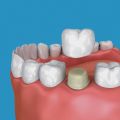Debunking 6 Common Myths About Pediatric Dentistry

Pediatric dentistry is critical in developing a child's dental health and general well-being. However, misunderstandings and disinformation frequently surround that particular field, causing fear and ignorance among parents. In this article, we aim to debunk six common myths about pediatric dentistry, shedding light on the importance of early dental care for children.
Myth 1: Baby teeth don't matter
There is a common misperception that baby teeth are unimportant since they will ultimately fall out. Contrary to popular opinion, baby teeth, often known as primary teeth, play important roles in a child's growth. They help in speech development, provide healthy nutrition through effective chewing, and serve as placeholders for permanent teeth.
Neglecting to care for baby teeth can result in a variety of problems, including cavities, infections, and misalignment of permanent teeth. Pediatric dentists highlight the value of early oral care in laying a solid basis for a child's future dental health.
Myth 2: Pediatric dentists are the same as general dentists
Another common misconception is that pediatric and general dentists are interchangeable. While both practitioners complete dental training, pediatric dentists receive extra instruction focusing on the particular needs and development of children's oral health.
Pediatric dentists are educated to address the emotional and behavioral aspects of working with children, resulting in an enjoyable environment that reduces anxiety. They have the necessary experience to treat particular dental issues in children, making them the best alternative for parents looking for complete care for their children's oral health.
Myth 3: Children don't need to see a dentist until they have all their teeth
Delaying a child's first dental appointment until all of their primary teeth are fully erupted is a common misunderstanding with severe consequences. The American Academy of Pediatric Dentistry advises that a child's first dental appointment occur between six months of the emergence of their first tooth or by their first birthday, whichever comes first.
Early dental appointments enable kids dentists to monitor oral growth, detect potential problems, and teach parents about healthy oral care habits. This preventive approach helps prevent the development of dental issues and provides an optimal dental experience for the children.
Myth 4: Dental sealants are unnecessary
Some parents believe dental sealants are unnecessary or are simply a means for dentists to boost their earnings. In fact, dental sealants are an effective preventative measure that may substantially decrease the incidence of cavities in children.
Dental sealants are thin coatings placed on the chewing surfaces of molars and premolars to create a barrier against bacteria and food particles. Sealants provide an extra layer of defense against cavities in children, improving long-term dental health.
Myth 5: Cavities in baby teeth don't require treatment
Another common myth is that tooth decay in infant teeth may be neglected since they will fall out soon. Disregarding cavities in primary teeth may result in pain and infection, and even interfere with the appropriate eruption of permanent teeth.
Pediatric dentists highlight the significance of addressing cavities in baby teeth. Early management not only avoids additional damage but also builds good oral health practices for a child in the future. Ignoring cavities can lead to more complicated dental procedures and undue pain for the children.
Myth 6: Fluoride is harmful to children
Concerns over fluoride's safety have given rise to the notion that it is harmful, particularly to children. In truth, fluoride is an important mineral that builds tooth enamel and increases its resistance to decay. Fluoridated water, toothpaste, and professional fluoride treatments are important aspects of preventive pediatric dental care.
Pediatric dentists closely monitor fluoride exposure to ensure that it remains at safe and beneficial levels for children. The regulated use of fluoride is a successful approach for preventing cavities and supporting good dental health throughout childhood.
The bottom line
Dispelling these common misconceptions about pediatric dentistry is critical for parents to make informed choices regarding their children's oral health. Understanding the importance of early dental care, pediatric dentists, and preventative measures may lead to a lifetime of healthy smiles. By dispelling these myths, we enable parents to prioritize their children's oral health and promote comfortable dental experiences from a young age.
Other articles and publications:
Articles and publications of other companies:
- +1 (646) 270-9836
- Long Island City
- grantny.com








